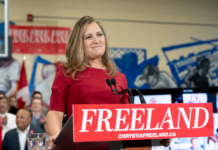Alberta is the latest voice in the growing opposition against the federal government’s proposed capital gains tax increase, urging the Liberals to reconsider the policy change.
Alberta Finance Minister Nate Horner sent a letter to his federal counterpart, Chrystia Freeland, warning her that the budget proposal would harm Canadians’ future standard of living.
“Your proposed tax increase is also damaging and unfair to the many small business owners who planned for retirement and are relying on the assets they built up and held in their small businesses,” said Horner.
He urged Freeland to reconsider the fairness of such a tax increase on families’ savings, as they do not have a taxpayer-supported pension plan like the Liberal minister and her colleagues.
Canada’s largest business groups, along with Canadian CEOs and tech leaders, have pleaded with the feds to scrap their “ill-advised inclusion rate increase” that would cause “irreparable harm to the Canadian innovation economy,” to no avail.
Finance Minister Chrystia Freeland announced plans alongside the 2024 federal budget to tax Canadian companies and individuals on two-thirds of their capital gains, increasing from 50%. Prime Minister Justin Trudeau subsequently defended the increase, saying it would generate $20 billion in funding for social programs.
Horner said that Alberta shares a sentiment felt by other provinces — frustration that they were not included in the decision-making process, despite the change affecting the shared federal-provincial tax base.
“Measures like these are forced upon provinces and undermine our pro-growth economic policies that seek to propel our whole country forward,” said Horner.
Alberta’s finance minister said the tax increase will amplify Canada’s failing productivity.
The Bank of Canada warned that low productivity would lead to further inflation before the tax increase. Canada’s productivity is already plummeting, falling from producing 88% of the value generated by the United States per hour in 1984 to 71% in 2022.
“(The tax increase) builds on the piling of federal policies harmful to investment. These policies are weakening our standing in the world and the standard of living of our people,” said Horner.
Not only has Canada’s standard of living decreased at an unprecedented rate compared to other countries in the post-war era, but the anger that Canadians feel towards government, economy, and policies reached an all-time high in May.
“As has been noted by the Canadian, Ontario, and Alberta Medical Associations, your tax increase also comes at a time when the Canadian healthcare system is under extreme pressure and our ability to attract and retain physicians is a serious challenge,” said Horner.
Healthcare leaders warned the federal government that this tax increase would drive doctors out of Canada. Canada already ranks last among wealthy nations for access to primary healthcare; additional outflow would further cement Canada at the bottom of the list.
Doctors are among the many professionals who incorporate their practices and use corporations to save for retirement instead of employer retirement or pension plans. These same doctors’ retirement plans contain assets subject to capital gains tax.
“Raising taxes on these professionals will only exacerbate the crisis and put more financial strain on provincial governments,” said Horner.
Aaron Wudrick, director of the Macdonald-Laurier Institute’s domestic policy program, said that this tax increase punishes people who save instead of spending their money because if you spend your money now, you won’t get hit with the capital gains tax from it being invested and growing.
“If you have apple seeds, the government is entitled to tax you on your seeds. They can take their share of the seeds. But, when you plant the seeds, and they grow into other things, they’re coming back for more. They’re coming back for another round of tax based on the same assets that you built up,” he said.
“On behalf of the government of Alberta, I am calling on you to cancel your proposed tax increase on capital gains. Canada needs policies that promote investment, innovation, and risk-taking, not new taxes that hinder productivity,” concluded Horner.





















